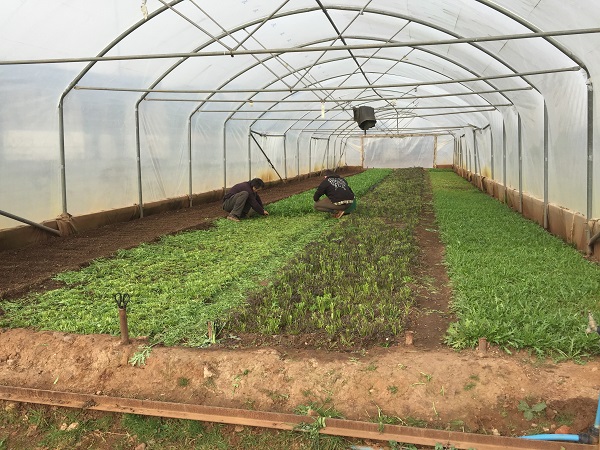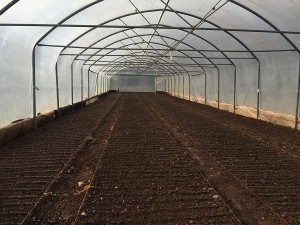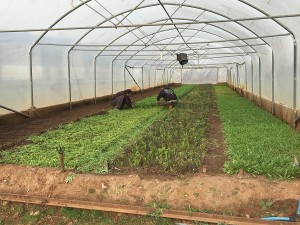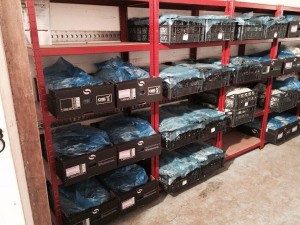“If you’ve got no knowledge of growing, no soil and no knowledge of Bristol or its food and drink industry, this is what you can do”, says Steve Glover, the man behind social enterprise and CIC The Severn Project, which began life back in 2010. With a half acre site tucked away behind Temple Meads and a further six acres in Whitchurch,The Severn Project is an urban growing scheme that produces a range of salad leaves and herbs that are sold to both businesses and consumers…but it’s much more than that. Steve, whose background is in addiction counselling, also set up the scheme in order to provide training and employment to those who are recovering from addictions, those who have committed criminal offences and those who suffer with poor mental health, helping them to get back into work.
The Severn Project, explains Steve, was begun with just £2,500 and a disused plot of land adjacent to Temple Meads Station: a plot of land where the soil was so poor that they had to bring around 800 tons of their own in order just to get the project off the ground. A combination of spent mushroom compost, soil seized from illegal cannabis factories by Avon & Somerset Police and soil from other sources helped them to get their Temple Meads site up and running: a site which now features six polytunnels, an office and two packing sheds with refrigeration. In Whitchurch, the site is expanding all the time, with plans for a café, teaching rooms and a farm shop all becoming closer to being realised.
It was amazing to see just how much is achieved at a site as small as Temple Meads. I was taken on a tour of the polytunnels, growing a range of leaves that include mustards, mizuna and rocket, which take just 4.5 weeks from seed to harvest in the winter, and 2 weeks in the summer. There’s a small amount of space on which Steve and his team grow leaves outside of the polytunnels too, and this tiny site is the hub of all of The Severn Project’s work, with all of the produce from here, Whitchurch and their satellite growers coming through the Temple Meads site before being distributed and delivered.
The refrigerated cabin, on the day of my visit, was filled with crates of loose leaves ready to be packed, as well as packed leaves waiting to be labelled and delivered to a number of Bristol’s well-known food and drink businesses, the names of which, along with their requirements, were crammed onto a large whiteboard on one wall of the room. Steve is in the process of sourcing equipment that will allow him to pack the produce on-site, but it is currently packed in Evesham: the team drive the leaves up in a chilled van, wait for the two hours or so that it takes to pack the produce, and drive it back down to Temple Meads to be prepared for delivery.
All of the work that is done by The Severn Project is achieved with a surprisingly small staff: Steve tells me that the maximum number of workers at any one time is around 14, but during winter, it’s just a skeleton staff – a lot of people don’t want outdoor work when the weather is so cold! The Severn Project has created 7 full-time jobs since it began, with more still to come as the Whitchurch site becomes more developed.
It’s clear from talking to Steve that The Severn Project is ever-growing: last winter, he says they were producing and selling around 100kg of leaves and herbs per week…a figure that has risen to 400kg this winter. Supplying to around 80 partners within the Bristol area – as well as selling to the public via fresh-range – there’s huge demand for his produce, and it’s easy to see why. Not only is it incredibly fresh, hyper-local and full of flavour, but the ethos of The Severn Project is fantastic, with much of the money they make continually being reinvested into the project to help the organisation to grow and to help to create more opportunities for vulnerable people looking for employment and the development of new skills.
Steve is keen that others get involved in the urban growing movement, but says that the biggest challenge is actually the fact that it is so fashionable. “We started with £2,500”, he says, “and we’re now turning over more than that each week. It attracts the wrong sort of attention, though: people ask me where I got my funding, assuming that all of our money is coming from above. When I tell them that I’ve done this with no funding, they’re no longer interested. We’re here to inspire people, though: we want to show what can be done without loads of money or knowhow.”



